
Molds & Accessories
No Demolding Lab Infrared Press Mold for Laboratory Applications
Item Number : PMI
Price varies based on specs and customizations
- Material
- Carbide YT15
- Sample size
- φ7-φ13 mm
- Cavity depth
- 5-10 mm
Shipping:
Contact us to get shipping details Enjoy On-time Dispatch Guarantee.
Why Choose Us
Easy ordering process, quality products, and dedicated support for your business success.
Applications
After the no demolding lab infrared mold is pressed, the sample does not need to be demolded. The sample has a good molding effect and high transmittance. It can be directly placed in the sample chamber of the infrared spectrometer for testing.
The mold is widely used in battery, superconductor, cement, ceramics, catalysis, silicate, powder metallurgy, sea mud analysis, biochemical analysis and new material sample preparation research and development. In addition, the product can also be used with calcium iron, infrared, X-ray fluorescence and other testing instruments.
Special sizes press molds can be customized according to customer requirements.
Detail & Parts
![Non-removable infrared special mold [Φ13mm]](https://image.kindle-tech.com/images/products/122/c2dd9d8eec5071aab5c220fc0e118eed67bd296970c9b.jpg)
![Non-removable infrared special mold [Φ7mm]](https://image.kindle-tech.com/images/products/122/04f71fe2090d36543e44d7e9fa2222b767bd2988c5157.jpg)
![Non-removable infrared special mold [Φ3mm]](https://image.kindle-tech.com/images/products/122/2fd9f3d22dec3d3c7a4a771a0d2bd61367bd29a083435.jpg)


Technical specifications
| Instrument model | PMI-A | PMI-B |
|---|---|---|
| Sample shape |  |
|
| Die material | Tungsten carbide | |
| Indenter hardness | HRC68-HRC85 | |
| Sample size | Φ13 mm(M) | Φ7 mm(M) |
| Cavity depth | 10mm(N) | 5mm(N) |
| Dimensions | Φ76*50*70mm(L*W*H) | Φ76*30*70mm(L*W*H) |
| Weight | 0.76Kg | 0.35Kg |
| Diagram of hydraulic powder press size | 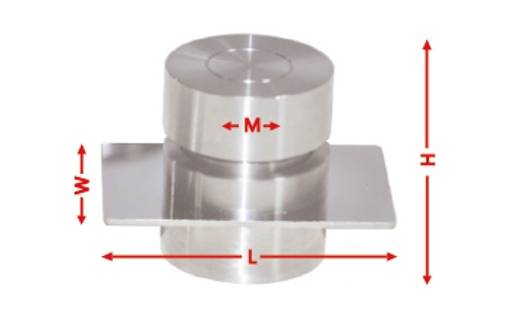 |
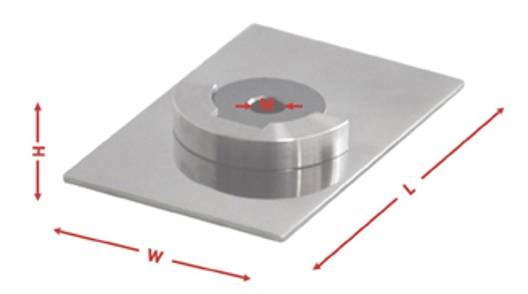 |
Operation steps
Infrared non-return mold pressing sample molding without demoulding, sample molding effect is good, high transmittance, directly placed in the infrared spectrometer sample bin for testing.

Step 1: Assemble the die according to the operation diagram and install the sample in the cavity.

Step 2: Put the die in the center of the hydraulic press and pressurize to required pressure.

Step 3:Assemble the die according to the release diagram ,eject the sample out of the die bushing with the screw rod.

Step 4: Take out the die from the hydraulic press , and remove the sample gently.
Precautions for mold maintenance
To ensure accurate test results, clean the mold surface with dust-free paper before each use to avoid the anti-rust oil from affecting the sample. Avoid exceeding the maximum pressure when applying pressure. Clean the mold and samples after use to prevent corrosion. Apply anti-rust oil and store the mold in a dry environment if not used for a long time to prevent damage.
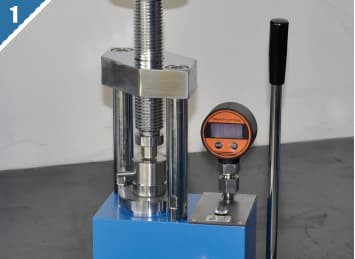
Step 1: Placing the Mold.
To begin, place the mold in the center of the tablet press. It is important to note that the maximum pressure of the mold cannot be exceeded when pressurized. This will prevent any damage to the mold and ensure accurate test results.

Step 2: Cleaning the Mold.
After each use, it is essential to clean the mold to prevent any contamination of the sample. Using dust-free paper, wipe the surface of the mold clean. If there are sample residues on the surface that cannot be removed, please do not use chemical reagents to clean and soak. This could potentially damage the mold and impact the accuracy of the test results.

Step 3: Applying Anti-Rust Oil.
If the mold is not used for an extended period, it is recommended to apply anti-rust oil on the surface of the mold to prevent rusting. This step will help prolong the life of the mold and ensure that it remains in good condition for future use.

Step 4: Storing the Mold.
Lastly, if the mold is not used for a long time, it needs to be stored in a dry environment. This will prevent any moisture from accumulating on the mold and causing damage.
Full range of lab press types
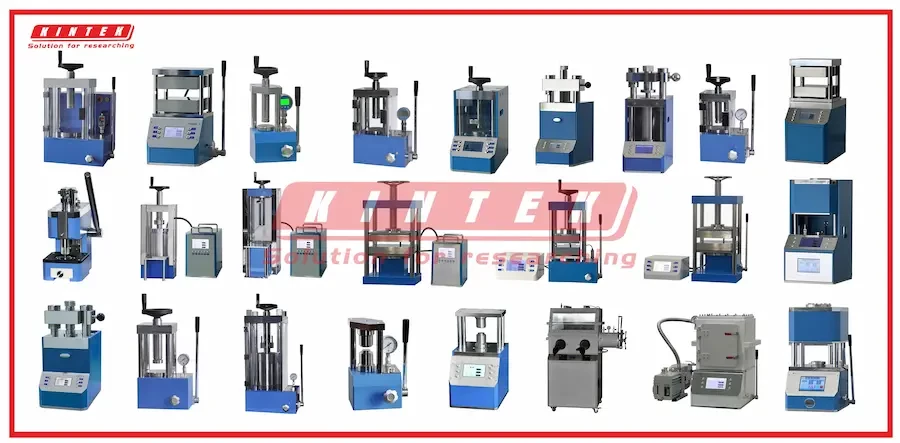
Click to view our full range of lab press products.
Any question? Our experts have helped many laboratories choose their lab press, contact us now!
Full range of types of laboratory press molds
We have a full range of molds for you to choose from, and the molds fit the body perfectly.
If you need molds with special shapes, we can also customize them for you.
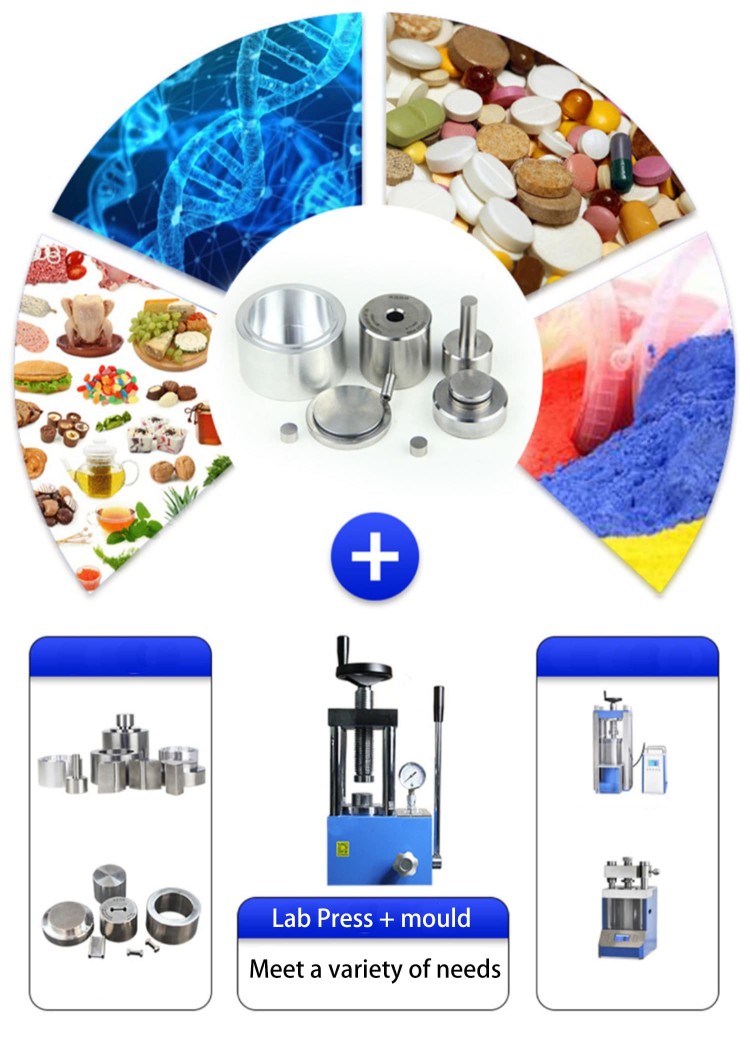
Warnings
Operator safety is the top important issue! Please operate the equipment with cautions. Working with inflammable& explosive or toxic gases is very dangerous, operators must take all necessary precautions before starting the equipment. Working with positive pressure inside the reactors or chambers is dangerous, operator must fellow the safety procedures strictly. Extra caution must also be taken when operating with air-reactive materials, especially under vacuum. A leak can draw air into the apparatus and cause a violent reaction to occur.
Designed for You
KinTek provide deep custom made service and equipment to worldwide customers, our specialized teamwork and rich experienced engineers are capable to undertake the custom tailoring hardware and software equipment requirements, and help our customer to build up the exclusive and personalized equipment and solution!
Would you please drop your ideas to us, our engineers are ready for you now!
Trusted by Industry Leaders

FAQ
What Is A Lab Press?
What Is A Press Mold?
What Is The Purpose Of A Hydraulic Press In Lab?
What Is Press Mould In Ceramics?
What Are Different Type Of Lab Presses?
How Are Pellet Molds Used?
What Types Of Materials Can Be Pelletized Using Pellet Molds?
How Can One Select The Appropriate Pellet Mold For Their Specific Application?
4.9 / 5
The non-demolding design of this infrared mold is a game-changer! It saves me so much time and effort in sample preparation.
4.8 / 5
I highly recommend this infrared mold for its exceptional build quality and durability. It's a reliable workhorse in my lab.
4.7 / 5
The infrared mold's compact size and user-friendly design make it a perfect fit for my benchtop. It's a valuable addition to my lab equipment.
4.9 / 5
The high transmittance of the samples produced by this mold is remarkable. It's an essential tool for infrared spectroscopy analysis.
4.8 / 5
This infrared mold has exceeded my expectations. It's a versatile tool that can be used with various testing instruments, making it a cost-effective investment for my lab.
4.7 / 5
The infrared mold produces high-quality samples with minimal effort. It streamlines my sample preparation process, allowing me to focus on more critical tasks.
4.9 / 5
The mold's ability to directly place samples in the infrared spectrometer chamber is a huge time-saver. It simplifies my workflow and enhances my productivity.
4.8 / 5
The infrared mold's compatibility with various sample types makes it a versatile tool in my laboratory. It's a valuable asset for researchers working with diverse materials.
4.7 / 5
I appreciate the mold's customization options. It allows me to tailor it to my specific research needs, ensuring accurate and reliable results.
4.9 / 5
The infrared mold's innovative design minimizes the risk of cracks or damage to samples during the cooling process, ensuring the integrity of my results.
4.8 / 5
The mold's sturdy construction and durable materials guarantee longevity and reliability in my laboratory's demanding environment.
4.7 / 5
The infrared mold's user-friendly operation and straightforward maintenance procedures make it accessible to researchers of all skill levels.
4.9 / 5
The mold's compact design and lightweight construction make it easy to maneuver and store, maximizing space utilization in my laboratory.
REQUEST A QUOTE
Our professional team will reply to you within one business day. Please feel free to contact us!
Related Products

Double Plate Heating Press Mold for Lab
Discover precision in heating with our Double Plate Heating Mold, featuring high-quality steel and uniform temperature control for efficient lab processes. Ideal for various thermal applications.
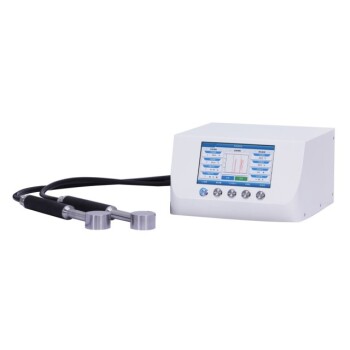
Infrared Heating Quantitative Flat Plate Press Mold
Discover advanced infrared heating solutions with high-density insulation and precise PID control for uniform thermal performance in various applications.
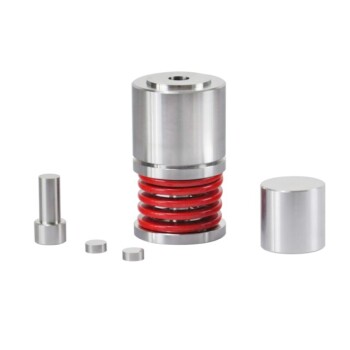
Round Bidirectional Press Mold for Lab
The round bidirectional press mold is a specialized tool used in high-pressure molding processes, particularly for creating intricate shapes from metal powders.
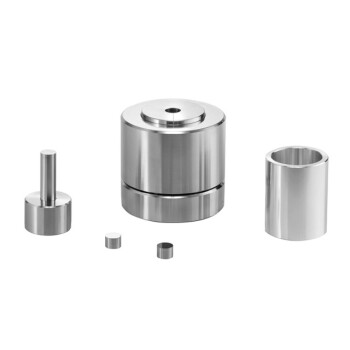
Assemble Lab Cylindrical Press Mold
Get reliable and precise molding with Assemble Lab Cylindrical Press Mold. Perfect for ultra-fine powder or delicate samples, widely used in material research and development.
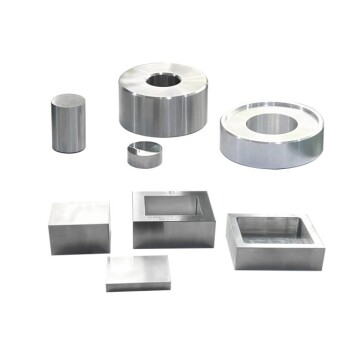
Special Heat Press Mold for Lab Use
Square, round and flat plate forming dies for hot presses.
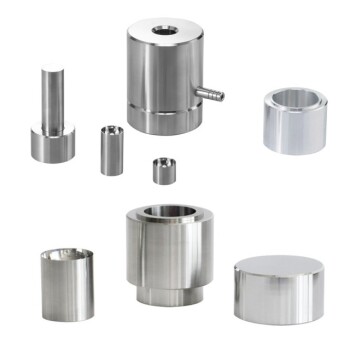
Ball Press Mold for Lab
Explore versatile Hydraulic Hot Press molds for precise compression molding. Ideal for creating various shapes and sizes with uniform stability.

Hydraulic Diaphragm Lab Filter Press for Laboratory Filtration
Hydraulic diaphragm lab press filter is one type lab scale filter press, it takes small footprint, and higher pressing power.
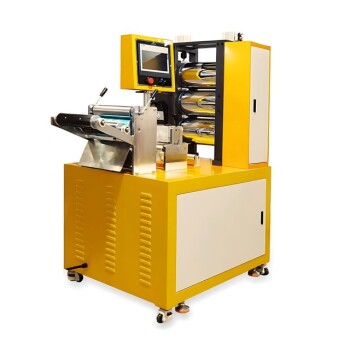
Small Lab Rubber Calendering Machine
Small lab rubber calendering machine is used for producing thin, continuous sheets of plastic or rubber materials. It is commonly employed in laboratories, small-scale production facilities, and prototyping environments to create films, coatings, and laminates with precise thickness and surface finish.

Laboratory Manual Hydraulic Pellet Press for Lab Use
Efficient Manure Lab Hydraulic Press with Safety Cover for sample preparation in material research, pharmacy, and electronic industries. Available in 15T to 60T.

Platinum Sheet Electrode for Laboratory and Industrial Applications
Elevate your experiments with our Platinum Sheet Electrode. Crafted with quality materials, our safe and durable models can be tailored to fit your needs.
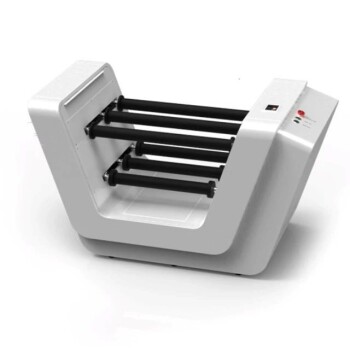
Laboratory Ten-Body Horizontal Jar Mill for Lab Use
The Ten-body horizontal jar mill is for 10 ball mill pots (3000ml or less). It has frequency conversion control, rubber roller movement, and PE protective cover.

High Energy Planetary Ball Mill Milling Machine for Laboratory
The biggest feature is that the high energy planetary ball mill can not only perform fast and effective grinding, but also has good crushing ability

kbr pellet press 2t
Introducing the KINTEK KBR Press - a handheld laboratory hydraulic press designed for entry-level users.
Related Articles

Infrared Press Mold Techniques for Non-Demolding Applications
Explore advanced infrared press mold techniques without demolding. Learn about the benefits, applications, and best practices for non-demolding lab processes.

A Guide To PREPARE SAMPLES FOR XRF ANALYSIS
There are many ways to prepare samples for XRF analysis. The choice of method will also affect the time it takes to get results and the cost of the analysis.

Everything You Need to Know About FTIR Pellet Press
Fourier Transform Infrared (FTIR) spectroscopy is a non-destructive analytical technique used to identify and quantify the chemical composition of a sample. FTIR pellet presses are used to prepare solid samples for FTIR analysis by compressing them into pellets.

Operating of Automatic Lab xrf Pellet Press
How to use the Automatic Lab xrf Pellet Press, including steel ring, plastic ring, boric acid mold

FTIR Pellet Press The Ultimate Solution for Precise Sample Preparation
Fourier Transform Infrared (FTIR) spectroscopy is a powerful analytical technique that can be used to identify and quantify the chemical components of a sample. However, to obtain accurate and reliable results, it is crucial to prepare the sample appropriately.

How To Turn XRF analysis sample preparation Into Success
In X-ray fluorescence (XRF) analysis, sample preparation is an important step because it can significantly impact both the quality and the efficiency of the analysis.

The Benchtop KBr Pellet Press: An Efficient Tool for Laboratory Use
The benchtop KBr pellet press is a versatile and efficient tool that produces uniform pellets, ensuring consistent and reliable results. In addition, its adjustable mold can be used flexibly to accommodate a variety of sample sizes and shapes.

Pressing Powder Samples and Molding Polymer Films: A Comprehensive Guide
Pressing powder samples is done to create a solid material that remains intact even after the load is removed. This process involves pushing the powder grains closer together, closing the gaps between them and forcing them to flow and rearrange themselves into a more compact arrangement. As the available volume reduces, the flow of particles stops, and they undergo plastic and elastic deformations that result in bonding between the grains.

Understanding Cold Isostatic Pressing and its Types
Cold isostatic pressing (CIP) is a method of processing materials that is based on the principle proposed by Blaise Pascal, known as Pascal's law. According to this principle, pressure applied in an enclosed fluid is transmitted in all directions throughout the fluid without any change in magnitude.

Simplify Sample Preparation with FTIR Pellet Press
FTIR (Fourier Transform Infrared) spectroscopy is a powerful analytical technique used to identify and quantify the chemical composition of materials.

The Role of a Porcelain Furnace in Dental Restorations
Porcelain furnaces play a crucial role in the creation of dental restorations, as they are used to fire ceramic materials, such as porcelain, to create durable and natural-looking dental prosthetics.

Infrared Spectroscopy Sample Preparation Operation Guide
A comprehensive guide on preparing samples for infrared spectroscopy analysis, covering gas, liquid, and solid samples.